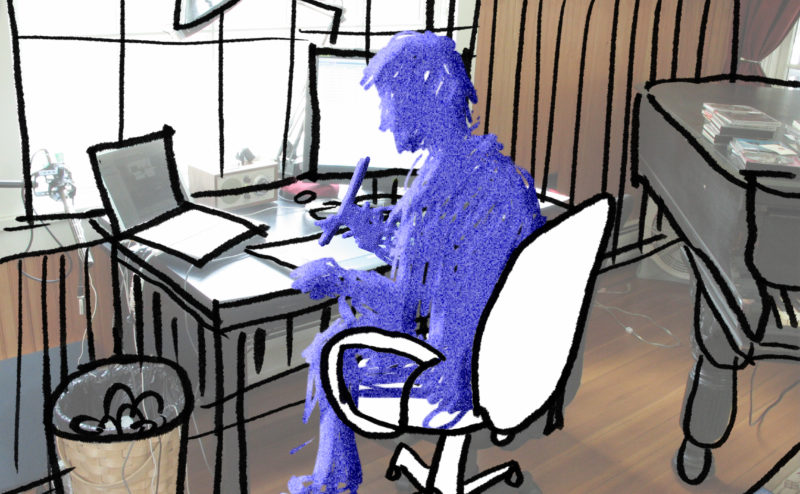
A Century of Sanctuary
Written by Nancy L. Babine | Posted by: Anonymous
At the end of the 19th century, Edward MacDowell was considered the outstanding American composer of his day. He and his wife, his former piano student who had given up her pursuit of a musical career to nurture his talent, split their time between New York City (where Edward was Chairman of Columbia University’s Department of Music) and Peterborough. Edward cherished the solitude and tranquility he found in the quiet New England town. There he could focus completely on his work. In 1896, the MacDowells purchased their own home in Peterborough, a farmhouse surrounded by 450 acres of forests and fields. Marian enhanced Edward’s beloved refuge by having a log cabin studio built, a private sanctuary where he produced some of his best work.
Having experienced the creative productivity that burgeons in an environment free from disruptions, Edward dreamed of sharing this gift with other artists, providing them a place to work uninterrupted in an idyllic setting of natural beauty, enriched by the company of other artists. His desire was fulfilled in May of 1907, when the MacDowell Colony was incorporated. Sadly, Edward saw only one season of his dream manifested. He became ill and died in 1908 at the age of 47, leaving Marian to carry on his vision.
Under Marian’s supervision, 23 one-room studios of the current 32 were built on the Peterborough property. For 30 years following Edward’s death, Marian tirelessly toured the continent, raising support for the Colony through lectures and piano recitals of her husband’s compositions. She remained an integral part of the operation of the colony as it grew, even delivering the picnic basket lunches to each studio doorstep at noon, a tradition that continues today. In 1956, at the age of 98, Marian died, leaving an extraordinary legacy to the world of art.
Though screenwriters have long been a part of the Colony, accepted under the writing discipline, filmmaking was not included in the list of disciplines until 1971. At the urging of board member, Elodie Osborne, the MacDowell Colony became one of the first artists’ colonies to recognize film as an art form. Since then, more than 250 filmmakers have been awarded fellowships. Filmmakers in residence are provided with facilities to support all aspects of filmmaking, including a suite of editing equipment donated by documentary filmmaker and board member, Ken Burns.
To commemorate the centennial of the MacDowell Colony, a suite of four short films was commissioned. Fellows were invited to submit proposals for films that were evocative of their experiences in residence. “(We) were looking for a variety of different types of filmmaking,” said Karen Sampson, communications associate of the MacDowell Colony. “And the ideas, themselves. Originality and voice.”
The four filmmakers scripted and directed a short film, shot on the grounds of the Colony, each film representing a season. The composite film, titled Seasons of MacDowell, demonstrates the diversity of filmmakers the Colony has attracted over the past three and a half decades. Michael Sullivan of PBS’ Frontline is the film’s executive producer. Journalist Robert MacNeil, who has served as chairman of the MacDowell Colony for 15 years, oversaw the project and narrates the film.
George Griffin, known for his work in animation, produced one of the four shorts, MacDowell, A User’s Manual. He shares an artist’s internal dialogue, fraught with anxieties, at the threshold of residency. He wonders what the “others” will be like. New friends, collaborators, allies or tormentors, phonies, art spies? Will the artist see spectacular fall foliage or dead ornamentation that no longer nourishes? What if he finds himself in the perfect studio, in the perfect setting, without distractions, and he sits down to work and there’s nothing there but a full-fledged creative block? “I’m not feeling too secure,” the artist confides.

From Elisabeth Subrin’s short, The Caretakers.
[Click to enlarge]
Another segment, The Caretakers, by experimental filmmaker, Elisabeth Subrin, places the artist in the studio, an empty white box, surrounded by the starkness of winter. The “tombstones,” which adorn all MacDowell studios, signed by the artists who have gone before, mock her. She is isolated, an outsider, and decides to give up, until a serendipitous encounter with a predecessor’s past compels her to embrace the gift of solitude.
Michael Almereyda, fictional narrative filmmaker, produced A Damn Fool Scheme. He intercuts footage from a 1954 film about the MacDowells with readings by MacDowell fellows to tell the history of the Colony and of its profound impact, not just on the art community, but on the culture.
Documentary filmmaker, David Petersen, reflects on the quality of the artist’s life in residence when one attunes his pulse to the rhythmic hum of nature in the last of four segments, 2 Months to be Quiet. Set in summer, he demonstrates how the rural surroundings become a part of the work. Wading in a stream, gathering twigs in the woods, or watching a flock of wild turkeys peck the ground outside a studio window all flow together with the unconscious mind in allowing the artist to give himself over completely to his work. The value of the quiet, one artist states, is incalculable.
Petersen has been in residence at the Colony five times. During his time there, he has written screenplays, worked on a treatment, a novel, short fiction, and edited film. Though the application for a fellowship requires an outline describing the project the artist will pursue while in residence, according to Petersen, it’s not unusual to change course. “It’s sort of like going into a wilderness area and saying I’m going to discover this and this, and I’m going to see these wild animals,” he said. “But of course, you’re in the wilderness and can’t predict what you’re going to see, but you know it’s going to be wondrous!”
Artists are frequently astounded by their productivity while in residence, as though time expands. Each artist has her or his own studio, all meals are provided and privacy is keenly guarded, allowing absolute focus on the work. Breakfast and dinner are shared communally at Colony Hall, offering opportunities for the cross pollination of ideas among artists of various disciplines. “That’s a really big part of the experience here,” Sampson said. “There are a lot of collaborations that evolve. Great discussions go on at the dinner table.”
Petersen believes that the communitas that develops can be the antidote to any prolonged feeling of isolation. “(There’s) a sense of simpatico spirit,” he said. “And a connectedness to others with the same urgency and madness you have to render something truthful in your perception.”
In addition to memorializing the centennial with Seasons of MacDowell, the MacDowell Colony enlisted the support of the department of film and media at the Museum of Modern Art (MOMA) to create a touring film and video series of the works of MacDowell fellows. Curated by Jytte Jensen of MOMA, who is a MacDowell board member, Filmmakers at MacDowell: The Studio System Reconsidered includes 25 short and feature length films. The media series, along with Seasons of MacDowell, premiered in May at MOMA, and continues to be screened at various venues around the country.
Among the venues is the upcoming New Hampshire Film Festival in Portsmouth. Two years ago festival director, Nicole Gregg, began working towards incorporating a tribute to the MacDowell Colony centennial into this year’s festival schedule. “It’s important to recognize that we have this incredible place right here in our state,” she said. “The MacDowell Colony has made incredible contributions to the film world.”
A screening of Seasons of MacDowell is scheduled for October 13th, followed by a Q&A with David Petersen. Additionally, two films from the touring film series, Playing the Part and Rain in a Dry Land, are included in the slate of 62 films. “This just seemed to be such a perfect fit,” Gregg said. She hopes this is the beginning of a long-term alliance between the festival and the MacDowell Colony, such as a continued effort to program MacDowell residents’ films.
For a century, the MacDowell Colony has provided artists with a supportive community where they find a respite from the troubles and trifles of everyday life, and immerse themselves in their art. It’s the place poet Hugh Ogden arrived scattered and unsure, and left in “peace and gratitude.” It’s the place writer James Baldwin described as his refuge and workshop, where he could “crouch in order to spring.” It’s the place that reaffirms for filmmaker David Petersen that “it’s good to live an artist’s life.”
The touring film series, Filmmakers at MacDowell: The Studio System Reconsidered, will close at the National Gallery of Art in Washington, DC on November 3rd. The final screening of Seasons of MacDowell is scheduled for December 1st at the Boston Athenaeum. Information about the MacDowell Colony can be found at www.macdowellcolony.org.
The New Hampshire Film Festival will be held in Portsmouth, October 11-14. Seasons of MacDowell will screen at noon on October 13th at the Music Hall; Playing the Part on October 13th at 2:10 pm at the Sheraton Harborside; Rain in a Dry Land on October 14th, at 2:20 pm at the Portsmouth Public Library. More information can be found at www.nhfilmfestival.com. The touring film series, Filmmakers at MacDowell: The Studio System Reconsidered, will close at the National Gallery of Art in Washington, DC on November 3rd. The final screening of Seasons of MacDowell is scheduled for December 1st at the Boston Athenaeum. Information about the MacDowell Colony can be found at www.macdowellcolony.org.










